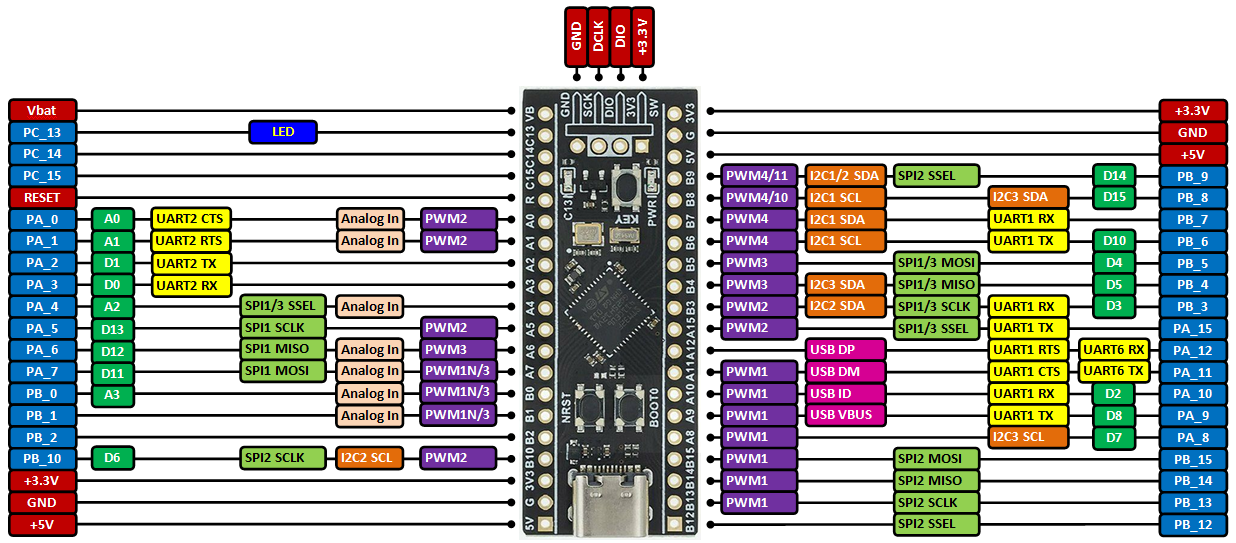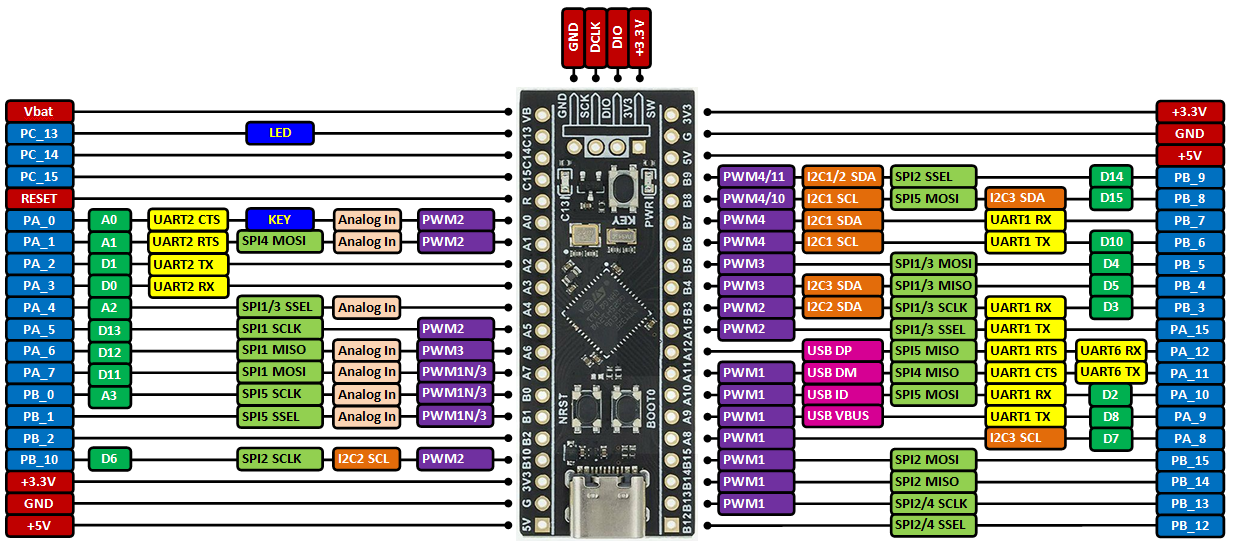BLACKPILL custom target.
BLACKPILL custom target
Board pinout
When equipped with STM32F401CCU6:
When equipped with STM32F411CEU6:
Advantages of the BLACKPILL custom target over the NUCLEO_F401RE/ NUCLEO_F411RE
- The onboard external 25 MHz crystal is used as system clock source rather than the less precise internal 16 MHz RC oscillator.
- The onboard LED works as LED1 in programs.
- The onboard KEY on STM32F411CEU6 boards works as USER_BUTTON pin in programs.
- You can use the USB peripheral in your programs and connect the board to the PC over the onboard USB connector. An example of using the USB peripheral as USBSerial (12 Mbit/s) is available here.
Building programs for the BLACKPILL custom target in Mbed Studio
- Connect an STM32 ST-Link programmer to your BLACKPILL board and PC (see below for more details).
- Create a new program in the Mbed Studio IDE.
- Right-click on the program's root folder and in the popup window select
Add library...
- Copy&paste the text https://os.mbed.com/users/hudakz/code/BLACKPILL_Custom_Target into the
Git or os.mbed.com URLedit box and click on theNextbutton.
- Open the drop-list and select
defaultasBranch or tagand click on theFinishbutton.
- Open the
BLACKPILL_Custom_Targetfolder and according to you board drag&drop theTARGET_BLACKPILL_F401CCor theTARGET_BLACKPILL_F411CEfolder and thecustom_targets.jsonfile one by one to the root folder of your program.
- Delete the
BLACKPILL_Custom_Targetfolder from your project. (Right-click and select delete).
- Open the
Targetdrop-list and click on the button with a "chip" icon on it (Manage custom targets) .
- Open the
USB devicedrop-list and select your STM32 ST-Link programmer.
- Open the
Build targetdrop-list and according to your board selectBLACKPILL_F401CCorBLACKPILL_F411CE.
- Click on the
Save Allbutton.
- Build your program (click on hammer button).
For more info visit
Import programBlackpill_Hello
Using low cost Blackpill (STM32F411CEU6) boards with mbed.
TARGET_BLACKPILL_F401CC/PinNames.h
- Committer:
- hudakz
- Date:
- 2022-03-19
- Revision:
- 7:3a74f7149fa4
File content as of revision 7:3a74f7149fa4:
/* mbed Microcontroller Library
*******************************************************************************
* Copyright (c) 2018, STMicroelectronics
* All rights reserved.
*
* Redistribution and use in source and binary forms, with or without
* modification, are permitted provided that the following conditions are met:
*
* 1. Redistributions of source code must retain the above copyright notice,
* this list of conditions and the following disclaimer.
* 2. Redistributions in binary form must reproduce the above copyright notice,
* this list of conditions and the following disclaimer in the documentation
* and/or other materials provided with the distribution.
* 3. Neither the name of STMicroelectronics nor the names of its contributors
* may be used to endorse or promote products derived from this software
* without specific prior written permission.
*
* THIS SOFTWARE IS PROVIDED BY THE COPYRIGHT HOLDERS AND CONTRIBUTORS "AS IS"
* AND ANY EXPRESS OR IMPLIED WARRANTIES, INCLUDING, BUT NOT LIMITED TO, THE
* IMPLIED WARRANTIES OF MERCHANTABILITY AND FITNESS FOR A PARTICULAR PURPOSE ARE
* DISCLAIMED. IN NO EVENT SHALL THE COPYRIGHT HOLDER OR CONTRIBUTORS BE LIABLE
* FOR ANY DIRECT, INDIRECT, INCIDENTAL, SPECIAL, EXEMPLARY, OR CONSEQUENTIAL
* DAMAGES (INCLUDING, BUT NOT LIMITED TO, PROCUREMENT OF SUBSTITUTE GOODS OR
* SERVICES; LOSS OF USE, DATA, OR PROFITS; OR BUSINESS INTERRUPTION) HOWEVER
* CAUSED AND ON ANY THEORY OF LIABILITY, WHETHER IN CONTRACT, STRICT LIABILITY,
* OR TORT (INCLUDING NEGLIGENCE OR OTHERWISE) ARISING IN ANY WAY OUT OF THE USE
* OF THIS SOFTWARE, EVEN IF ADVISED OF THE POSSIBILITY OF SUCH DAMAGE.
*******************************************************************************
*/
#ifndef MBED_PINNAMES_H
#define MBED_PINNAMES_H
#include "cmsis.h"
#include "PinNamesTypes.h"
#ifdef __cplusplus
extern "C" {
#endif
/* If this macro is defined, then constexpr utility functions for pin-map seach can be used. */
#define STATIC_PINMAP_READY 1
typedef enum {
ALT0 = 0x100,
ALT1 = 0x200,
ALT2 = 0x300,
ALT3 = 0x400
} ALTx;
typedef enum {
// Not connected
NC = (int)0xFFFFFFFF,
PA_0 = 0x00,
PA_1 = 0x01,
PA_1_ALT0 = PA_1 | ALT0,
PA_2 = 0x02,
PA_3 = 0x03,
PA_4 = 0x04,
PA_4_ALT0 = PA_4 | ALT0,
PA_5 = 0x05,
PA_6 = 0x06,
PA_7 = 0x07,
PA_7_ALT0 = PA_7 | ALT0,
PA_7_ALT1 = PA_7 | ALT1,
PA_7_ALT2 = PA_7 | ALT2,
PA_8 = 0x08,
PA_9 = 0x09,
PA_10 = 0x0A,
PA_11 = 0x0B,
PA_12 = 0x0C,
PA_13 = 0x0D,
PA_14 = 0x0E,
PA_15 = 0x0F,
PA_15_ALT0 = PA_15 | ALT0,
PB_0 = 0x10,
PB_0_ALT0 = PB_0 | ALT0,
PB_0_ALT1 = PB_0 | ALT1,
PB_1 = 0x11,
PB_1_ALT0 = PB_1 | ALT0,
PB_1_ALT1 = PB_1 | ALT1,
PB_2 = 0x12,
PB_3 = 0x13,
PB_3_ALT0 = PB_3 | ALT0,
PB_4 = 0x14,
PB_4_ALT0 = PB_4 | ALT0,
PB_4_ALT1 = PB_4 | ALT1,
PB_5 = 0x15,
PB_5_ALT0 = PB_5 | ALT0,
PB_5_ALT1 = PB_5 | ALT1,
PB_6 = 0x16,
PB_7 = 0x17,
PB_8 = 0x18,
PB_8_ALT0 = PB_8 | ALT0,
PB_8_ALT1 = PB_8 | ALT1,
PB_9 = 0x19,
PB_9_ALT0 = PB_9 | ALT0,
PB_9_ALT1 = PB_9 | ALT1,
PB_10 = 0x1A,
PB_12 = 0x1C,
PB_12_ALT0 = PB_12 | ALT0,
PB_13 = 0x1D,
PB_13_ALT0 = PB_13 | ALT0,
PB_14 = 0x1E,
PB_15 = 0x1F,
PC_0 = 0x20,
PC_1 = 0x21,
PC_2 = 0x22,
PC_3 = 0x23,
PC_4 = 0x24,
PC_5 = 0x25,
PC_6 = 0x26,
PC_7 = 0x27,
PC_8 = 0x28,
PC_9 = 0x29,
PC_10 = 0x2A,
PC_11 = 0x2B,
PC_12 = 0x2C,
PC_13 = 0x2D,
PC_14 = 0x2E,
PC_15 = 0x2F,
PD_2 = 0x32,
PH_0 = 0x70,
PH_1 = 0x71,
// ADC internal channels
ADC_TEMP = 0xF0,
ADC_VREF = 0xF1,
ADC_VBAT = 0xF2,
// Arduino connector namings
A0 = PA_0,
A1 = PA_1,
A2 = PA_4,
A3 = PB_0,
A4 = NC,
A5 = NC,
D0 = PA_3,
D1 = PA_2,
D2 = PA_10,
D3 = PB_3,
D4 = PB_5,
D5 = PB_4,
D6 = PB_10,
D7 = PA_8,
D8 = PA_9,
D9 = NC,
D10 = PB_6,
D11 = PA_7,
D12 = PA_6,
D13 = PA_5,
D14 = PB_9,
D15 = PB_8,
// STDIO for console print
#ifdef MBED_CONF_TARGET_STDIO_UART_TX
CONSOLE_TX = MBED_CONF_TARGET_STDIO_UART_TX,
#else
CONSOLE_TX = PA_2,
#endif
#ifdef MBED_CONF_TARGET_STDIO_UART_RX
CONSOLE_RX = MBED_CONF_TARGET_STDIO_UART_RX,
#else
CONSOLE_RX = PA_3,
#endif
// Generic signals namings
LED1 = PC_13,
LED2 = PC_13,
LED3 = PC_13,
LED4 = PC_13,
LED_RED = PC_13,
USER_BUTTON = PA_0,
// Standardized button names
BUTTON1 = USER_BUTTON,
// Serial backword compatibility
STDIO_UART_TX = CONSOLE_TX,
STDIO_UART_RX = CONSOLE_RX,
SERIAL_TX = CONSOLE_TX,
SERIAL_RX = CONSOLE_RX,
#ifndef USBTX
USBTX = CONSOLE_TX,
#endif
#ifndef USBRX
USBRX = CONSOLE_RX,
#endif
I2C_SCL = PB_8,
I2C_SDA = PB_9,
SPI_MOSI = PA_7,
SPI_MISO = PA_6,
SPI_SCK = PA_5,
SPI_CS = PB_6,
PWM_OUT = PB_3,
/**** USB FS pins ****/
USB_OTG_FS_DM = PA_11,
USB_OTG_FS_DP = PA_12,
USB_OTG_FS_ID = PA_10,
USB_OTG_FS_SOF = PA_8,
USB_OTG_FS_VBUS = PA_9,
/**** OSCILLATOR pins ****/
RCC_OSC32_IN = PC_14,
RCC_OSC32_OUT = PC_15,
RCC_OSC_IN = PH_0,
RCC_OSC_OUT = PH_1,
/**** DEBUG pins ****/
SYS_JTCK_SWCLK = PA_14,
SYS_JTDI = PA_15,
SYS_JTDO_SWO = PB_3,
SYS_JTMS_SWDIO = PA_13,
SYS_JTRST = PB_4,
SYS_WKUP = PA_0,
} PinName;
#ifdef __cplusplus
}
#endif
#endif


